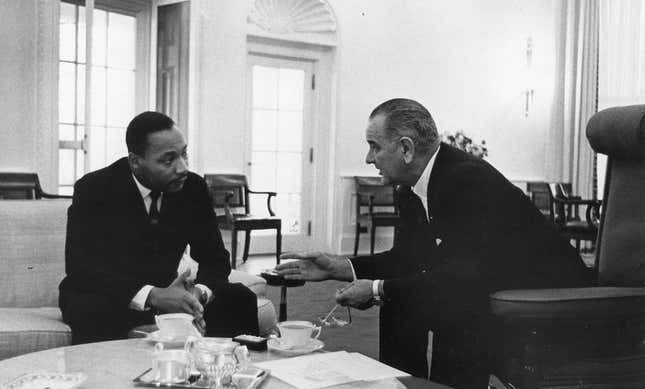
Donald Trump is elbowing his way to the table of hate occupied by the likes of Andrew Jackson, Andrew Johnson and Woodrow Wilson, men who used the weight of their presidential office to advance bigotry.
But as the freak show that is the Trump administration ramps up - and with both Black History Month and President’s Day on the horizon - it is important for Black Americans to remember that bigotry wasn’t the guiding principle for all presidents.
Most of the 45 men who have served as president were either indifferent to the needs of Black folks or actively opposed to pursuing policies that were a help to us. A handful, however, moved the ball forward for us even if they all weren’t always down for the cause.
Abraham Lincoln gets most of the love in this area because he issued the Emancipation Proclamation, which sought to free slaves who lived in states in active rebellion against the United States. It was a thunderclap, and Black Americans remembered him well after he was assassinated, lining the rails, weeping and waving as his body was transported back to Illinois.
Lincoln hasn’t lost his place of primacy among presidents, but contemporary scholarship has offered a more nuanced view of the 16th president, one best summed up by words he wrote to newspaper editor and publisher Horace Greeley in 1862 at the height of the Civil War.
“My paramount object in this struggle is to save the Union, and is not either to save or to destroy slavery,” Lincoln wrote. “If I could save the Union without freeing any slave I would do it, and if I could save it by freeing all the slaves I would do it; and if I could save it by freeing some and leaving others alone, I would also do that.”
So, yeah, props for the proclamation and all, but Lincoln made it clear he would have been fine with our ancestors in bondage if it meant saving the Union.
For a more fulsome backing of our interests, we can look to a few of Lincoln’s successors, starting with Ulysses S. Grant.
Grant signed legislation that prohibited racial discrimination in voting, guaranteed equal rights for Black people in public accommodations and created the Department of Justice to do battle against white terror groups like the Ku Klux Klan. Grant supported the use of federal troops in southern states to protect newly emancipated Black Americans from racial violence.
Six decades later, Harry S. Truman, a Missourian who cracked racist jokes, used racial slurs and opposed interracial marriage, moved the ball further for Black Americans when he signed Executive Order 9981. That order desegregated the U.S. armed forces, opening a path to prosperity that millions of Black men and women have taken.
Two presidents after Truman, Lyndon B. Johnson signed a range of civil rights legislation aimed at unwinding Jim Crow. He signed into law assistance programs millions of Black Americans used to escape the deepest dregs of destitution, and he hired civil rights hero Thurgood Marshall as his solicitor general before elevating him to the Supreme Court.
Finally, there is Barack Obama, whose example of ethics and eloquence was just about as important as his policies. Not that those policies were insignificant. It fell to the nation’s first Black president to pull the country out of the greatest economic calamity since the Great Depression. His Affordable Care Act, better known as Obamacare, has provided health care to millions of Black Americans who might otherwise have gone without it.
Of course, Obama’s rise was fuel for Trump’s racism, which he has now ridden to two successful runs for the presidency. Trump might wish otherwise, but he leads a nation where Black Americans are no longer enslaved, can vote, can legally patronize public accommodations, can serve and advance in the military without regard to race and can rely on their federal government if they need it to avoid desperate hardship and for healthcare. Eat your heart out at that table, Mr. President.

